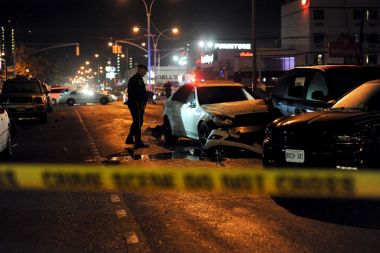It's one of the biggest killers in the world and we don't talk about it...

In an age of seemingly endless war and terrorism, it's easy to forget that there are things which for those of us who are fortunate enough to live in a peaceful, Western country are much more likely to kill us.
Suicide is the biggest killer of young men in the UK. Drug overdoses killed 44,000 people in the US last year. But both countries and many more besides have a problem that we don't really talk about. Deaths and injuries caused by vehicles.
1.4 million people across the world die every year in road crashes. This is more than TB, 50 per cent more than malaria. On average, males are nearly three times more likely to be killed than females. It's expected that by 2030, the number of road deaths will rise by 50 per cent – meaning more people will be killed on the road than by HIV/AIDS.
I was going to call them "road accidents" but that doesn't do justice to what I'm talking about here. The word "accident" implies that that there was nothing that could be done to prevent it. But clearly, that's not the case. Drivers who have drunk alcohol before getting behind the wheel. Drivers who use their phones. Even the drivers who knowingly and deliberately drive at speed just for the thrill.
None of these are "accidental." They're all choices made by people who could have taken a different path, but they selfishly opt to endanger the lives of others.
One church leader has had enough. This week, Rev Dale Barton, a vicar in Bradford, spoke out after being first on the scene of a crash which happened last year. A 15-year-old boy died in the incident and Barton says it's time something was done to catch those who flout the law.
"On any given day I will see a car, if not more than one, driving at high speed on the road, sometimes in the daytime. There are four primary schools, and around 5,000 primary school children, in the area, but people are always driving through red lights" he said.
He added that there is a culture – especially of young men – involved in deliberately fast and dangerous driving. "It is mostly boy racers I see driving at dangerous speeds. I have never seen any enforcement. They are doing it because they know they are not going to get caught. We need number plate recognition and some speed traps."
Speed cameras and other enforcement measures are clearly part of the solution, but as ever, regulation won't be enough to curb dangerous behaviour. Education needs to be part of the answer. On several occasions I've approached drivers of cars which have been speeding round my neighbourhood. They do so repeatedly – fitting the 'boy racer' model.
When I suggest to them that a child could come out from the pavement at any moment and they would be at risk of being killed, the thought doesn't appear to have occurred to the drivers. Or if it has, they seem willing to take their chances of driving at astonishingly high speeds round residential roads, and if a toddler or elderly person gets in the way, then so be it.
So if education isn't enough, what might tackle irresponsible dangerous driving? It seems to me that many of those who drive like maniacs are compensating for something. Angry young men, often in groups, trying to prove something to the world. That they can be faster (and therefore better? More significant? Loved, even?) Maybe by the time they're careering round the streets endangering the lives of my neighbours, it's far too late. But maybe, if they were made to feel valued and didn't need to prove themselves by turbocharging their engines, we'd have fewer problems.
A car can be a deadly weapon. Over half a ton of metal with a powerful engine attached. What chance does a small child stand, up against a speeding, drunk, texting driver?
Roadpeace is an organisation campaigning for justice for victims, calling for proper punishment for offenders and speaking up for the families of those tens of thousands of people lost every year.
It says, "Our members want to see lessons learned from their loss, to believe that their loved one did not die completely in vain. They want to see others spared their suffering, either by safer roads and fewer victims or by an improved response by the justice system to those deaths and injuries that were not prevented."
That seems like a good goal to share.











